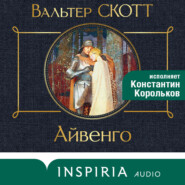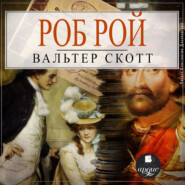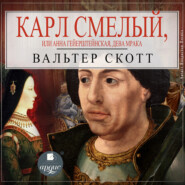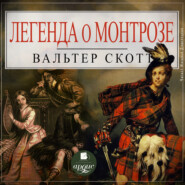По всем вопросам обращайтесь на: info@litportal.ru
(©) 2003-2024.
✖
Old Mortality, Complete
Настройки чтения
Размер шрифта
Высота строк
Поля
“But, father,” interrupted Jenny, “they say the twa reiving loons drave the cow frae the gudewife o’ Bell’s-moor, just because she gaed to hear a field-preaching ae Sabbath afternoon.”
“Whisht! ye silly tawpie,” said her father, “we have naething to do how they come by the bestial they sell—be that atween them and their consciences.—Aweel—Take notice, Jenny, of that dour, stour-looking carle that sits by the cheek o’ the ingle, and turns his back on a’ men. He looks like ane o’ the hill-folk, for I saw him start a wee when he saw the red-coats, and I jalouse he wad hae liked to hae ridden by, but his horse (it’s a gude gelding) was ower sair travailed; he behoved to stop whether he wad or no. Serve him cannily, Jenny, and wi’ little din, and dinna bring the sodgers on him by speering ony questions at him; but let na him hae a room to himsell, they wad say we were hiding him.—For yoursell, Jenny, ye’ll be civil to a’ the folk, and take nae heed o’ ony nonsense and daffing the young lads may say t’ye. Folk in the hostler line maun put up wi’ muckle. Your mither, rest her saul, could pit up wi’ as muckle as maist women—but aff hands is fair play; and if ony body be uncivil ye may gie me a cry—Aweel,—when the malt begins to get aboon the meal, they’ll begin to speak about government in kirk and state, and then, Jenny, they are like to quarrel—let them be doing—anger’s a drouthy passion, and the mair they dispute, the mair ale they’ll drink; but ye were best serve them wi’ a pint o’ the sma’ browst, it will heat them less, and they’ll never ken the difference.”
“But, father,” said Jenny, “if they come to lounder ilk ither, as they did last time, suldna I cry on you?”
“At no hand, Jenny; the redder gets aye the warst lick in the fray. If the sodgers draw their swords, ye’ll cry on the corporal and the guard. If the country folk tak the tangs and poker, ye’ll cry on the bailie and town-officers. But in nae event cry on me, for I am wearied wi’ doudling the bag o’ wind a’ day, and I am gaun to eat my dinner quietly in the spence.—And, now I think on’t, the Laird of Lickitup (that’s him that was the laird) was speering for sma’ drink and a saut herring—gie him a pu’ be the sleeve, and round into his lug I wad be blithe o’ his company to dine wi’ me; he was a gude customer anes in a day, and wants naething but means to be a gude ane again—he likes drink as weel as e’er he did. And if ye ken ony puir body o’ our acquaintance that’s blate for want o’ siller, and has far to gang hame, ye needna stick to gie them a waught o’ drink and a bannock—we’ll ne’er miss’t, and it looks creditable in a house like ours. And now, hinny, gang awa’, and serve the folk, but first bring me my dinner, and twa chappins o’ yill and the mutchkin stoup o’ brandy.”
Having thus devolved his whole cares on Jenny as prime minister, Niel Blane and the ci-devant laird, once his patron, but now glad to be his trencher-companion, sate down to enjoy themselves for the remainder of the evening, remote from the bustle of the public room.
All in Jenny’s department was in full activity. The knights of the popinjay received and requited the hospitable entertainment of their captain, who, though he spared the cup himself, took care it should go round with due celerity among the rest, who might not have otherwise deemed themselves handsomely treated. Their numbers melted away by degrees, and were at length diminished to four or five, who began to talk of breaking up their party. At another table, at some distance, sat two of the dragoons, whom Niel Blane had mentioned, a sergeant and a private in the celebrated John Grahame of Claverhouse’s regiment of Life-Guards. Even the non-commissioned officers and privates in these corps were not considered as ordinary mercenaries, but rather approached to the rank of the French mousquetaires, being regarded in the light of cadets, who performed the duties of rank-and-file with the prospect of obtaining commissions in case of distinguishing themselves.
Many young men of good families were to be found in the ranks, a circumstance which added to the pride and self-consequence of these troops. A remarkable instance of this occurred in the person of the non-commissioned officer in question. His real name was Francis Stewart, but he was universally known by the appellation of Bothwell, being lineally descended from the last earl of that name; not the infamous lover of the unfortunate Queen Mary, but Francis Stewart, Earl of Bothwell, whose turbulence and repeated conspiracies embarrassed the early part of James Sixth’s reign, and who at length died in exile in great poverty. The son of this Earl had sued to Charles I. for the restitution of part of his father’s forfeited estates, but the grasp of the nobles to whom they had been allotted was too tenacious to be unclenched. The breaking out of the civil wars utterly ruined him, by intercepting a small pension which Charles I. had allowed him, and he died in the utmost indigence. His son, after having served as a soldier abroad and in Britain, and passed through several vicissitudes of fortune, was fain to content himself with the situation of a non-commissioned officer in the Life-Guards, although lineally descended from the royal family, the father of the forfeited Earl of Bothwell having been a natural son of James VI.
[Note: Sergeant Bothwell. The history of the restless and ambitious Francis Stewart, Earl of Bothwell, makes a considerable figure in the reign of James VI. of Scotland, and First of England. After being repeatedly pardoned for acts of treason, he was at length obliged to retire abroad, where he died in great misery. Great part of his forfeited estate was bestowed on Walter Scott, first Lord of Buccleuch, and on the first Earl of Roxburghe.
Francis Stewart, son of the forfeited Earl, obtained from the favour of Charles I. a decreet-arbitral, appointing the two noblemen, grantees of his father’s estate, to restore the same, or make some compensation for retaining it. The barony of Crichton, with its beautiful castle, was surrendered by the curators of Francis, Earl of Buccleuch, but he retained the far more extensive property in Liddesdale. James Stewart also, as appears from writings in the author’s possession, made an advantageous composition with the Earl of Roxburghe. “But,” says the satirical Scotstarvet, “male parta pejus dilabuntur;” for he never brooked them, (enjoyed them,) nor was any thing the richer, since they accrued to his creditors, and are now in the possession of Dr Seaton. His eldest son Francis became a trooper in the late war; as for the other brother John, who was Abbot of Coldingham, he also disposed all that estate, and now has nothing, but lives on the charity of his friends. “The Staggering State of the Scots Statesmen for One Hundred Years,” by Sir John Scot of Scotstarvet. Edinburgh, 1754. P. 154.
Francis Stewart, who had been a trooper during the great Civil War, seems to have received no preferment, after the Restoration, suited to his high birth, though, in fact, third cousin to Charles II. Captain Crichton, the friend of Dean Swift, who published his Memoirs, found him a private gentleman in the King’s Life-Guards. At the same time this was no degrading condition; for Fountainhall records a duel fought between a Life-Guardsman and an officer in the militia, because the latter had taken upon him to assume superior rank as an officer, to a gentleman private in the Life-Guards. The Life-Guards man was killed in the rencontre, and his antagonist was executed for murder.
The character of Bothwell, except in relation to the name, is entirely ideal.]
Great personal strength, and dexterity in the use of his arms, as well as the remarkable circumstances of his descent, had recommended this man to the attention of his officers. But he partook in a great degree of the licentiousness and oppressive disposition, which the habit of acting as agents for government in levying fines, exacting free quarters, and otherwise oppressing the Presbyterian recusants, had rendered too general among these soldiers. They were so much accustomed to such missions, that they conceived themselves at liberty to commit all manner of license with impunity, as if totally exempted from all law and authority, excepting the command of their officers. On such occasions Bothwell was usually the most forward.
It is probable that Bothwell and his companions would not so long have remained quiet, but for respect to the presence of their Cornet, who commanded the small party quartered in the borough, and who was engaged in a game at dice with the curate of the place. But both of these being suddenly called from their amusement to speak with the chief magistrate upon some urgent business, Bothwell was not long of evincing his contempt for the rest of the company.
“Is it not a strange thing, Halliday,” he said to his comrade, “to see a set of bumpkins sit carousing here this whole evening, without having drank the king’s health?”
“They have drank the king’s health,” said Halliday. “I heard that green kail-worm of a lad name his majesty’s health.”
“Did he?” said Bothwell. “Then, Tom, we’ll have them drink the Archbishop of St Andrew’s health, and do it on their knees too.”
“So we will, by G—,” said Halliday; “and he that refuses it, we’ll have him to the guard-house, and teach him to ride the colt foaled of an acorn, with a brace of carabines at each foot to keep him steady.”
“Right, Tom,” continued Bothwell; “and, to do all things in order, I’ll begin with that sulky blue-bonnet in the ingle-nook.”
He rose accordingly, and taking his sheathed broadsword under his arm to support the insolence which he meditated, placed himself in front of the stranger noticed by Niel Blane, in his admonitions to his daughter, as being, in all probability, one of the hill-folk, or refractory presbyterians.
“I make so bold as to request of your precision, beloved,” said the trooper, in a tone of affected solemnity, and assuming the snuffle of a country preacher, “that you will arise from your seat, beloved, and, having bent your hams until your knees do rest upon the floor, beloved, that you will turn over this measure (called by the profane a gill) of the comfortable creature, which the carnal denominate brandy, to the health and glorification of his Grace the Archbishop of St Andrews, the worthy primate of all Scotland.”
All waited for the stranger’s answer.—His features, austere even to ferocity, with a cast of eye, which, without being actually oblique, approached nearly to a squint, and which gave a very sinister expression to his countenance, joined to a frame, square, strong, and muscular, though something under the middle size, seemed to announce a man unlikely to understand rude jesting, or to receive insults with impunity.
“And what is the consequence,” said he, “if I should not be disposed to comply with your uncivil request?”
“The consequence thereof, beloved,” said Bothwell, in the same tone of raillery, “will be, firstly, that I will tweak thy proboscis or nose. Secondly, beloved, that I will administer my fist to thy distorted visual optics; and will conclude, beloved, with a practical application of the flat of my sword to the shoulders of the recusant.”
“Is it even so?” said the stranger; “then give me the cup;” and, taking it in his hand, he said, with a peculiar expression of voice and manner, “The Archbishop of St Andrews, and the place he now worthily holds;—may each prelate in Scotland soon be as the Right Reverend James Sharpe!”
“He has taken the test,” said Halliday, exultingly.
“But with a qualification,” said Bothwell; “I don’t understand what the devil the crop-eared whig means.”
“Come, gentlemen,” said Morton, who became impatient of their insolence, “we are here met as good subjects, and on a merry occasion; and we have a right to expect we shall not be troubled with this sort of discussion.”
Bothwell was about to make a surly answer, but Halliday reminded him in a whisper, that there were strict injunctions that the soldiers should give no offence to the men who were sent out to the musters agreeably to the council’s orders. So, after honouring Morton with a broad and fierce stare, he said, “Well, Mr Popinjay, I shall not disturb your reign; I reckon it will be out by twelve at night.—Is it not an odd thing, Halliday,” he continued, addressing his companion, “that they should make such a fuss about cracking off their birding-pieces at a mark which any woman or boy could hit at a day’s practice? If Captain Popinjay now, or any of his troop, would try a bout, either with the broadsword, backsword, single rapier, or rapier and dagger, for a gold noble, the first-drawn blood, there would be some soul in it,—or, zounds, would the bumpkins but wrestle, or pitch the bar, or putt the stone, or throw the axle-tree, if (touching the end of Morton’s sword scornfully with his toe) they carry things about them that they are afraid to draw.”
Morton’s patience and prudence now gave way entirely, and he was about to make a very angry answer to Bothwell’s insolent observations, when the stranger stepped forward.
“This is my quarrel,” he said, “and in the name of the good cause, I will see it out myself.—Hark thee, friend,” (to Bothwell,) “wilt thou wrestle a fall with me?”
“With my whole spirit, beloved,” answered Bothwell; “yea I will strive with thee, to the downfall of one or both.”
“Then, as my trust is in Him that can help,” retorted his antagonist, “I will forthwith make thee an example to all such railing Rabshakehs!”
With that he dropped his coarse grey horseman’s coat from his shoulders, and, extending his strong brawny arms with a look of determined resolution, he offered himself to the contest. The soldier was nothing abashed by the muscular frame, broad chest, square shoulders, and hardy look of his antagonist, but, whistling with great composure, unbuckled his belt, and laid aside his military coat. The company stood round them, anxious for the event.
In the first struggle the trooper seemed to have some advantage, and also in the second, though neither could be considered as decisive. But it was plain he had put his whole strength too suddenly forth, against an antagonist possessed of great endurance, skill, vigour, and length of wind. In the third close, the countryman lifted his opponent fairly from the floor, and hurled him to the ground with such violence, that he lay for an instant stunned and motionless. His comrade Halliday immediately drew his sword; “You have killed my sergeant,” he exclaimed to the victorious wrestler, “and by all that is sacred you shall answer it!”
“Stand back!” cried Morton and his companions, “it was all fair play; your comrade sought a fall, and he has got it.”
“That is true enough,” said Bothwell, as he slowly rose; “put up your bilbo, Tom. I did not think there was a crop-ear of them all could have laid the best cap and feather in the King’s Life-Guards on the floor of a rascally change-house.—Hark ye, friend, give me your hand.” The stranger held out his hand. “I promise you,” said Bothwell, squeezing his hand very hard, “that the time will come when we shall meet again, and try this game over in a more earnest manner.”
“And I’ll promise you,” said the stranger, returning the grasp with equal firmness, “that when we next meet, I will lay your head as low as it lay even now, when you shall lack the power to lift it up again.”
“Well, beloved,” answered Bothwell, “if thou be’st a whig, thou art a stout and a brave one, and so good even to thee—Hadst best take thy nag before the Cornet makes the round; for, I promise thee, he has stay’d less suspicious-looking persons.”
The stranger seemed to think that the hint was not to be neglected; he flung down his reckoning, and going into the stable, saddled and brought out a powerful black horse, now recruited by rest and forage, and turning to Morton, observed, “I ride towards Milnwood, which I hear is your home; will you give me the advantage and protection of your company?”
“Certainly,” said Morton; although there was something of gloomy and relentless severity in the man’s manner from which his mind recoiled. His companions, after a courteous good-night, broke up and went off in different directions, some keeping them company for about a mile, until they dropped off one by one, and the travellers were left alone.
The company had not long left the Howff, as Blane’s public-house was called, when the trumpets and kettle-drums sounded. The troopers got under arms in the market-place at this unexpected summons, while, with faces of anxiety and earnestness, Cornet Grahame, a kinsman of Claverhouse, and the Provost of the borough, followed by half-a-dozen soldiers, and town-officers with halberts, entered the apartment of Niel Blane.
“Guard the doors!” were the first words which the Cornet spoke; “let no man leave the house.—So, Bothwell, how comes this? Did you not hear them sound boot and saddle?”
“He was just going to quarters, sir,” said his comrade; “he has had a bad fall.”
“In a fray, I suppose?” said Grahame. “If you neglect duty in this way, your royal blood will hardly protect you.”
“How have I neglected duty?” said Bothwell, sulkily.
“You should have been at quarters, Sergeant Bothwell,” replied the officer; “you have lost a golden opportunity. Here are news come that the Archbishop of St Andrews has been strangely and foully assassinated by a body of the rebel whigs, who pursued and stopped his carriage on Magus-Muir, near the town of St Andrews, dragged him out, and dispatched him with their swords and daggers.” [Note: The general account of this act of assassination is to be found in all histories of the period. A more particular narrative may be found in the words of one of the actors, James Russell, in the Appendix to Kirkton’s History of the Church of Scotland, published by Charles Kirkpatrick Sharpe, Esquire. 4to, Edinburgh, 1817.]
All stood aghast at the intelligence.
“Here are their descriptions,” continued the Cornet, pulling out a proclamation, “the reward of a thousand merks is on each of their heads.”
“The test, the test, and the qualification!” said Bothwell to Halliday; “I know the meaning now—Zounds, that we should not have stopt him! Go saddle our horses, Halliday.—Was there one of the men, Cornet, very stout and square-made, double-chested, thin in the flanks, hawk-nosed?”
“Stay, stay,” said Cornet Grahame, “let me look at the paper.—Hackston of Rathillet, tall, thin, black-haired.”

















